Related Research Articles

Alan Mathison Turing was an English mathematician, computer scientist, logician, cryptanalyst, philosopher, and theoretical biologist. Turing was highly influential in the development of theoretical computer science, providing a formalisation of the concepts of algorithm and computation with the Turing machine, which can be considered a model of a general-purpose computer. Turing is widely considered to be the father of theoretical computer science and artificial intelligence. Despite these accomplishments, he was never fully recognised in his home country during his lifetime due to his homosexuality and because much of his work was covered by the Official Secrets Act.

The Cinema of Italy comprises the films made within Italy or by Italian directors. The first Italian director is considered to be Vittorio Calcina, a collaborator of the Lumière Brothers, who filmed Pope Leo XIII in 1896. Since its beginning, Italian cinema has influenced film movements worldwide. As of 2018, Italian films have won 14 Academy Awards for Best Foreign Language Film as well as 12 Palmes d'Or, one Academy Award for Best Picture and many Golden Lions and Golden Bears.

Federico Fellini, was an Italian film director and screenwriter known for his distinctive style, which blends fantasy and baroque images with earthiness. He is recognized as one of the greatest and most influential filmmakers of all time. His films have ranked in polls such as Cahiers du cinéma and Sight & Sound, which lists his 1963 film 8½ as the 10th-greatest film.

Amarcord is a 1973 Italian comedy-drama film directed by Federico Fellini, a semi-autobiographical tale about Titta, an adolescent boy growing up among an eccentric cast of characters in the village of Borgo San Giuliano in 1930s Fascist Italy. The film's title is a univerbation of the Romagnolo phrase a m'arcôrd. The title then became a neologism of the Italian language, with the meaning of 'nostalgic revocation'.
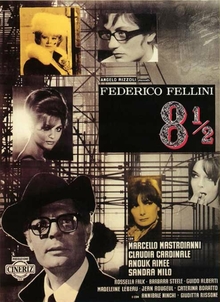
8 1⁄2 is a 1963 Italian epic surrealist comedy-drama film directed by Federico Fellini and co-scripted by Fellini, Tullio Pinelli, Ennio Flaiano, and Brunello Rondi. It stars Marcello Mastroianni as Guido Anselmi, a famous Italian film director who suffers from stifled creativity as he attempts to direct an epic science fiction film. It is shot in black and white by cinematographer Gianni Di Venanzo and features a soundtrack by Nino Rota, with costume and set designs by Piero Gherardi.
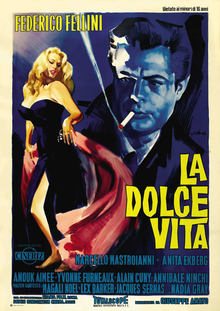
La Dolce Vita is a 1960 comedy-drama film directed and co-written by Federico Fellini. The film follows Marcello Rubini, a journalist writing for gossip magazines, over seven days and nights on his journey through the "sweet life" of Rome in a fruitless search for love and happiness. The screenplay, co-written by Fellini and three other screenwriters, can be divided into a prologue, seven major episodes interrupted by an intermezzo, and an epilogue, according to the most common interpretation.

Kerstin Anita Marianne Ekberg was a Swedish actress active in American and European films. She is best known for her role as Sylvia in the Federico Fellini film La Dolce Vita (1960). Ekberg worked primarily in Italy, where she became a permanent resident in 1964.
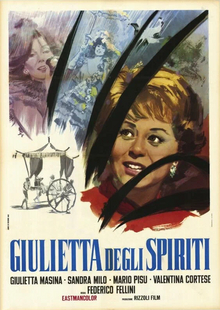
Juliet of the Spirits is a 1965 Italian-French fantasy comedy-drama film directed by Federico Fellini and starring Giulietta Masina, Sandra Milo, Mario Pisu, Valentina Cortese, and Valeska Gert. The film is about the visions, memories, and mysticism that help a middle-aged woman find the strength to leave her philandering husband. The film uses "caricatural types and dream situations to represent a psychic landscape." It was Fellini's first feature-length color film, but followed his use of color in The Temptation of Doctor Antonio episode in the portmanteau film Boccaccio '70 (1962). Juliet of the Spirits won the 1966 Golden Globe Award for Best Foreign Language Film.

Cinecittà Studios, is a large film studio in Rome, Italy. With an area of 400,000 square metres, it is the largest film studio in Europe, and is considered the hub of Italian cinema. The studios were constructed during the Fascist era as part of a plan to revive the Italian film industry.
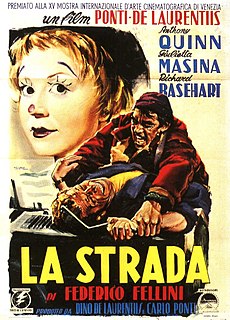
La strada is a 1954 Italian drama film directed by Federico Fellini from his own screenplay co-written with Tullio Pinelli and Ennio Flaiano. The film tells the story of Gelsomina, a simple-minded young woman bought from her mother by Zampanò, a brutish strongman who takes her with him on the road.

(William) Andrew Coulthard Robinson is a British author and former newspaper editor.

I vitelloni is a 1953 Italian comedy-drama directed by Federico Fellini from a screenplay by Fellini, Ennio Flaiano and Tullio Pinelli. The film launched the career of Alberto Sordi, one of post-war Italy's most significant and popular comedians, who stars with Franco Fabrizi and Franco Interlenghi in a story of five young Italian men at crucial turning points in their small town lives. Recognized as a pivotal work in the director's artistic evolution, the film has distinct autobiographical elements that mirror important societal changes in 1950s Italy. Recipient of both the Venice Film Festival Silver Lion in 1953, and an Academy Award nomination for Best Writing in 1958, the film's success restored Fellini's reputation after the commercial failure of The White Sheik (1952).
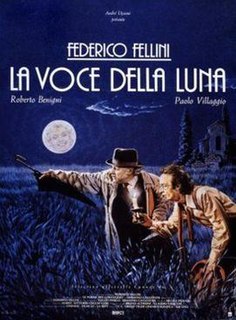
The Voice of the Moon is a 1990 Italian dramatic comedy film directed by Federico Fellini and starring Roberto Benigni, Paolo Villaggio, and Nadia Ottaviani. Based on the novel Il poema dei lunatici by Ermano Cavazzoni, and revisiting themes Fellini first explored in La strada (1954), the film is about a fake inspector of wells and a former prefect who wander through the Emilia-Romagna countryside of Fellini's childhood and discover a dystopia of television commercials, fascism, beauty pageants, rock music, Catholicism, and pagan ritual.
Fellini Satyricon, or simply Satyricon, is a 1969 Italian fantasy drama film written and directed by Federico Fellini and loosely based on Petronius's work Satyricon, written during the reign of Emperor Nero and set in imperial Rome. The film is divided into nine episodes, following Encolpius and his friend Ascyltus as they try to win the heart of a young boy named Gitón within a surreal and dream-like Roman landscape.

Fellini's Casanova is a 1976 Italian film by director Federico Fellini, adapted from the autobiography of Giacomo Casanova, the 18th-century adventurer and writer.

The cinema of Georgia has been noted for its cinematography in Europe. Italian film director Federico Fellini was an admirer of the Georgian film: "Georgian film is a completely unique phenomenon, vivid, philosophically inspiring, very wise, childlike. There is everything that can make me cry and I ought to say that it is not an easy thing."
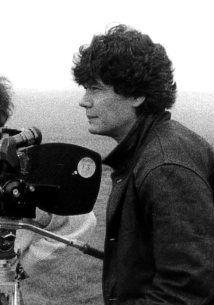
DamianPettigrew is a Canadian filmmaker, screenwriter, producer, author, and multimedia artist, best known for his cinematic portraits of Balthus, Federico Fellini and Jean Giraud.

Fellini: A Director's Notebook is an Italian documentary for television directed by Federico Fellini shot in 16mm and first broadcast in the United States on NBC in 1969, on NBC Experiment in Television.

Brunello Rondi was a prolific Italian screen writer and film director best known for his frequent script collaborations with Federico Fellini.
Peter Bondanella (1943–2017) was Distinguished Professor Emeritus of Italian, Comparative Literature, and Film Studies at Indiana University, United States.